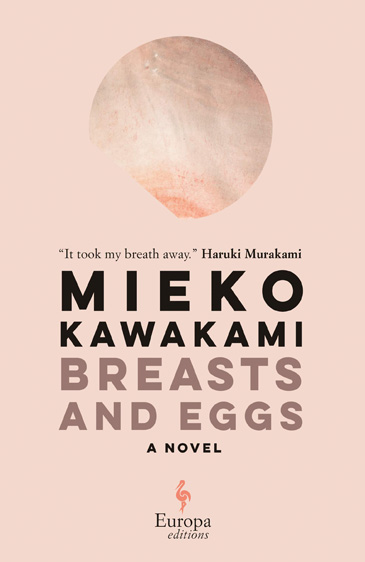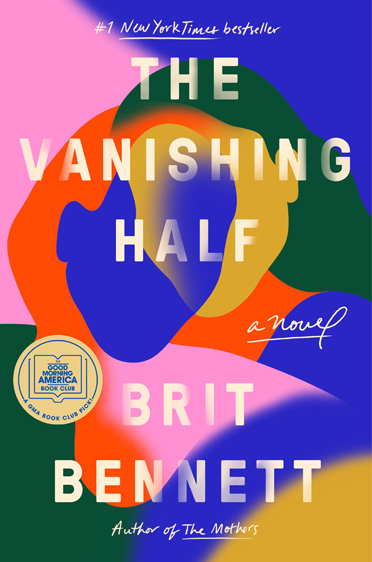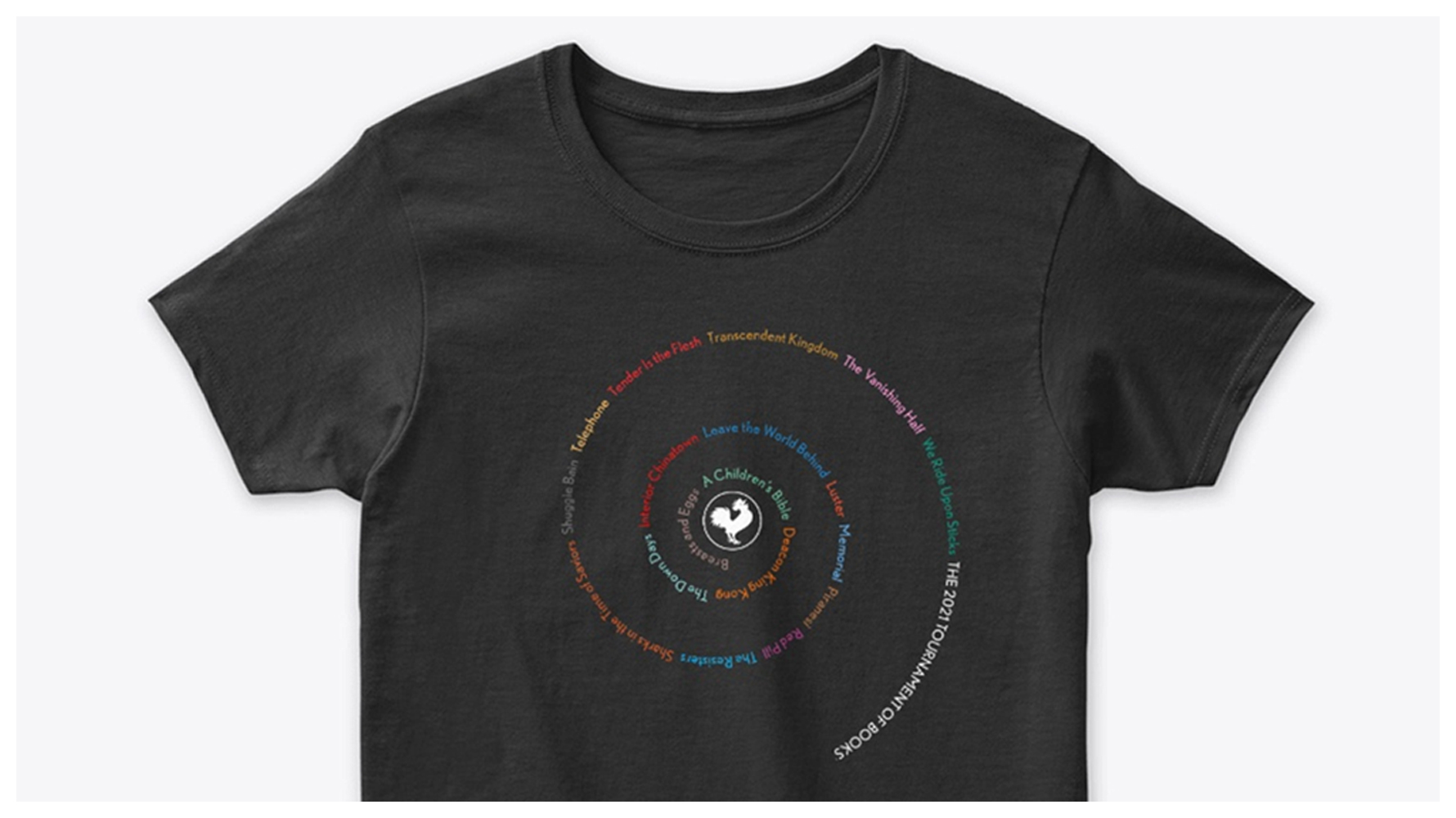-
March 30, 2021
Zombie Round
-
Mieko Kawakami
3Breasts and Eggs
v.
Z2The Vanishing HalfBrit Bennett
-
Judged by
Sonya Chung
Let me begin by saying that I am currently a stressed-out, mentally disorganized, poorly rested person who once upon a time was supremely balanced and productive, a person with “highly effective habits,” good at compartmentalizing, and at saying No and Yes to both personal and professional commitments with ninja-like instinct and precision. I got shit done. Quite a lot of shit, in fact. Also I slept well. (Sigh.)
This year, however, has been disastrous on that front. Need I say why? Maybe I do. A lot of writers have been more productive this year than usual. My half-baked hypothesis is that people with robust public-facing and social lives hunkered down and found their inner chamber of self-motivating solitude. Me? My calibrated, reliable introversion crossed into darker places, and I began: 1) throwing projects and ideas against the wall in a kind of manic desperation (too many of them stuck); and 2) saying Yes to anything and everything, thinking (i.e., not thinking), I’ve got nuthin but time, right? (Wrong.)
But—here’s what I’m getting at—I do not regret saying Yes to the Tournament of Books, because of its brilliant approach to “judging” books: reading is subjective, period. Book “reviewing”—the idea that one can somehow objectively pronounce a book’s worth or excellence in a vacuum, for the good of “the general reader” (whoever the hell that is)—has always struck me as crazy and essentially dishonest. If you love books, how can passion and particularity (emotional, intellectual, experiential) not infuse and inform the way you respond to a novel?
Especially now. For better or worse, I have read these two novels a year into a worldwide pandemic, two months into the post-traumatic-post-Trump era, infected with and enlightened by a heightened awareness of the injustices and fear-driven abuses that are still far too endemic to our institutions. A good novel can serve as an “escape,” a way of imagining and sinking in to an alternative world that is bigger, better, or just different from the one we live in; but the nature of the particular alternative world we crave in any given moment is surely shaped by what we need (to escape from) in that moment. And so, reading Brit Bennett’s The Vanishing Half and Mieko Kawakami’s Breasts and Eggs in tandem helped bring into relief what I need from a novel these days.
The eponymous breasts and eggs of Breasts and Eggs’s Osaka-and-Tokyo-based contemporary story are straightforwardly, anatomically, just what they are (and what you might expect based on the Europa Editions pink cover). In the first half of the book, one character, the narrator Natsuko’s older sister Makiko, wants breast implants. Makiko’s teenage daughter Midoriko hates her own changing body and her peers’ obsession with breasts, which fuels her already teeming conflicts with her mother. Midoriko’s angst causes her to also question why she was ever born, why her mother had her in the first place if she’s so unhappy about (as evidenced by her drinking habits) having to earn a living for the two of them as a waitress in a bar. Thus, the story is set up for the second half of the novel—the eggs part—which focuses on Natsuko’s desire to have a child by sperm donation.
Breasts and Eggs also delves provocatively into the ethics of parenthood itself: Who “should” have children? Is modern parenthood, by assisted means or otherwise, inherently selfish and thus a cruelty toward the children who become victims of that narcissism? A character named Yuriko, who was conceived by an anonymous sperm donor and was traumatized by sexual abuse at the hands of her mother’s partner, makes the most impassioned argument against choosing to procreate:
Desire is a justification on its own … It’s not like you need a reason to kill somebody or have a child … I’m not talking about genes or families or knowing who your parents are … It’s basically the same for everyone … What I’m asking is, why do you want to bring a child into the world? What would possess you to do that? … Let me guess. You think giving birth is some kind of miracle. The gift of life… What if you have a child and that child wishes with every bone in her body that she’d never been born?…
Why is it that people think this is ok? Why do people see no harm in having children? They do it with smiles on their faces, as if it’s not an act of violence. You force this other being into the world, this other being that never asked to be born. You do this absurd thing because that’s what you want for yourself. And that doesn’t make any sense … Once you have children you can’t un-have them … This is real life. That’s what I’m talking about. The pain that comes with reality.
Also notable in Breasts and Eggs is an admirable directness when it comes to women’s bodies—breasts, menstrual blood, other bodily functions. And for Western audiences (this is Kawakami’s first novel translated into English), a story focused on a poor Osaka family, as opposed to Tokyo or Kyoto bourgeoisie, feels somewhat fresh. The novel seems to me intentional about these subversions of expectation and representation—we catch a glimpse of an underground transgender world in Osaka, for example, and are also exposed to the experience of asexuality via Natsuko’s inability to enjoy/disinterest in sex. For better or worse, the author for me feels very present, just behind/beneath the text: a thinking, crafting mind, driven to explore various ideas and issues through characters, places, and human interaction. The problem with this presence, for me, is that it feels a bit too wrought: the author’s interests obstruct the reader’s experience of full immersion. Midoriko’s sections, for instance, are written in first-person journal entries; they hit the ear less like an adolescent’s true voice than as an adult author ventriloquizing a teenager as a kind of thought experiment.
* * *
The Vanishing Half begins as many compelling novels do—with a speculative, faintly allegorical premise set in a very real world: what if there was a town in the deep South populated (by design) by light-skinned Blacks who could pass as white? And what if, generations later, there lived in that town twin sisters who lighted out for the big city—one of whom moves West and lives as a white woman, and the other returns with a dark-skinned daughter in tow?
There’s a full range of Note Books and related stationery products at fieldnotesbrand.com. Field Notes is proud to once again be a sponsor of the Tournament of Books.
Mallard, La., is that fictional place; Alphonse Decuir the fictional former slave/son of a slave owner who wanted to build “a third place,” for “men like him who would never be accepted as white but refused to be treated like Negroes.” The twin sisters, Stella and Desiree Vignes, diverge from each other for decades, until their daughters, Kennedy and Jude, cross paths by chance and lead the two sisters back to each other.
This is a novel that starts with—and is perhaps committed to—ideas, but loves its characters even more. Is Stella the “bad” sister for denying her Blackness and availing herself and her daughter of white privilege? Did Desiree sell out by abandoning her dream of leaving Mallard behind and becoming a great actress? Yes, maybe, and who cares. What we care about are the nuanced journeys and beautifully particularized humans—full individuals yet also “halves” of each other. The binary starting point is, in a way, the novel’s creative engine—its explicit confrontation with the both/and complexities of an either/or proposition. Yes, the residents of Mallard can pass for white, but most of them do not: they continue to work as domestics for white people (as Desiree, Stella, and their mother did), live as second-class citizens, and suffer the violence of racism.
The photograph [of Desiree and Stella] was from a funeral, Jude told [Kennedy] …
“Who died?” she said.
“Their daddy. He was killed.”
“By who?”
Jude shrugged. “Bunch of white men.”
She didn’t know what was more shocking, the revelation or how casually Jude offered it.
“What?” she said. “Why?”
“Does there have to be a reason why?”
“When someone gets killed? Usually.”
“Well, there isn’t. It just happened. Right in front of them.”
In this scene, Stella’s daughter Kennedy, who until recently believed she was white, contends not only with the possibility that she is Black, but that her grandfather, who looked as white as she does, was killed for no reason other than being Black.
The neatness of the premise (twins, roads dividing, two more daughters, Black and white literally) is the kind of creative constraint that, in the hands of a talented author, gives way to the magical dimensions of character and story. In this case, The Vanishing Half’s roving yet also intimate omniscient narration gives us multiple interior experiences, each a rich, imperfect piece of this complicated whole. At the same time, the novel does not fall into the trap of diffusion that can make a polyphonic story feel watered down or chaotic: the story is ultimately anchored by Jude, the third-generation truth-seeker and outsider, who keeps her eyes on the prize—integrity, loyalty, authentic romantic love, and personal ambition.
If the novel does indulge its polyphony, it does so by occasionally getting carried away with its ensemble-cast prerogatives: While I’m glad to see a transsexual character represented in this novel, I’m not sure the character Reese, Jude’s boyfriend, earns his keep as a full character in his own right, as opposed to a representative. In fact, the male-companion characters—Desiree’s partner Early Jones, and Stella’s boyfriend Frantz—both also for me fell a bit flat.
*
Choosing which book to advance was not particularly difficult. What I need from a novel these days is human vibration and heat—among characters, between me and the characters, and perhaps most importantly, between the author and her characters. Breasts and Eggs sets itself out to investigate some important questions and controversial ideas—motherhood as a choice versus a burden, social class and the arts, sex/the body and female identity—but does so a bit clinically for me, poking at tender skin and wounds with a scalpel but never quite penetrating to the blood and guts. Everyone in the novel, the first-person narrator most notably, struggles to feel much of anything, and thus so did I. In The Vanishing Half, a character does vanish at the end, but leaves traces of soul struggle everywhere, on every life they touch, and we root for them all, even the ones who break our hearts. It may seem counterintuitive that the feeling of heartbreak is partly what I need from a novel right now; but then again, make no mistake, we are all going to need ways of accessing and processing the many forms of loss and grief from this last year.
Match Commentary
By Dan Brewster & Rosecrans Baldwin
Rosecrans Baldwin: For our final appearance of a bookseller in the commentary booth this year, we’re joined by Dan Brewster of Prologue Bookstore! Dan, please tell the folks a little bit about yourself and your shop.
Dan Brewster: Hello everyone, and thanks so much for inviting me to take part in the Tournament of Books! I own and run Prologue Bookshop in Columbus, Ohio, and we have been open since November 2018. We’re a small shop wedged between the tourist part of town and the university, so we get a little of both worlds.
Rosecrans: Great. So, today’s match sets the stage for tomorrow’s championship. Yesterday’s winner Interior Chinatown will now face The Vanishing Half, a Zombie favorite (and big bestseller) that lost its opening match only to return by way of the popular vote to douse the Cinderella story of Breasts and Eggs, which found its way through three separate matches. What do you think of today’s judgment?
Dan: Well, first off, I so emphasize with Judge Chung’s pandemic stress. There are days that are just as hard as last March, at least for me. I think we all have to keep being patient and understanding toward each other.
Rosecrans: Big cheers to that.
Dan: Back to the books: Both of these novels were incredibly popular at the store this year.
Rosecrans: Hey, no kidding.
Dan: And rightfully so! Unfortunately, I only got a chance to read portions of each. From my perspective, the judge got this one right. The Vanishing Half is one of those rare books that got unanimous rave reviews from our booksellers and customers, and was an easy handsell to any fiction reader. The characters and humanity resonated with a lot of readers, and I just love overhearing customers recommend it to the friends they’re browsing with. You can hear the effect it had on them. I previously read The Mothers, Bennett’s first book, and loved it. She’s had such an incredible first two books, I can’t wait to see what she works on next!
Rosecrans: I don’t mean to pry (yes, I do), but what kind of stuff are you overhearing?
Dan: The Vanishing Half is one of those novels that is so well-constructed that it’s difficult to pinpoint any specific strength. I know our readers raved about the strong women characters, the realistic family tension, the handling of complex issues of race. Even moreso, they loved how all of that intertwined into a truly compelling, beautifully written story. When our customers were recommending the book to each other, which happened frequently, they usually just said “You have to read it.”
Rosecrans: As to Breasts and Eggs, I’m kind of surprised it’s been popular in the store, if only because it felt pretty unknown when I first read it.
Dan: I first became aware of Kawakami around the time her book was released, when part of her interview with Haruki Murakami was published on LitHub. During the interview, she calls him out over the way he treats his female characters in his books.
Rosecrans: That was a big deal for people and thankfully a bit more serious-minded than the typical Murakami bingo.
Dan: The publicity around the book also featured Murakami calling Kawakami his “favorite young novelist,” which is such a strong endorsement. Speaking just for our own store, we found it really easy to hand-sell Breasts and Eggs after that. There are a lot of readers who have read and enjoyed Murakami, but are looking for something similar, but new. Since it was a story with strong female characters and relationships, that definitely added to the appeal. It wasn’t just us—we had quite a few customers who came in seeking it out last summer.
Rosecrans: Personally I loved: the introspection, the checkbook concerns, the languor of daily life. Anyway, the judge writes, “What I need from a novel these days is human vibration and heat,” and some days I feel that, but some days I also want something icy (I’m reading two lesser-known works by Patricia Highsmith right now). Does that ring true for you?
Dan: My reading habits were shredded this year. These days, I’m mostly looking for anything that’s light, escapist, and comfortable. Normally I read a bunch of literary fiction, speculative fiction from fantasy to science fiction, and anything set in Ohio. Since the pandemic started, I’ve mostly stopped reading anything I’m worried will be too sad or stressful, which is a lot. I’ve also had some of those infamous reading ruts, where my anxiety was too high to focus on reading.
Rosecrans: Yeah, well, I think that’s true for a lot of us. One last thing: Your store, Prologue, is a fairly recent venture. How has it been, running a newish business this past year?
Dan: I get this question a lot, and it’s hard to answer. This has been a really hard year for the store, since many of the most enjoyable parts have stopped, and our space isn’t well-equipped to pivot to ecommerce. At the same time, as long as I can look ahead to a time where I’m not checking headcount at the door and chastising folks whose masks have fallen under their nose, I try to be optimistic. Running a store was incredibly exciting and rewarding before the virus hit, and I’m excited for that to resume.
Rosecrans: That’s great to hear!
Big thanks to Dan and all of the booksellers who joined us this year. We’ll see everybody tomorrow for the championship. One last piece of business: Per tradition, we’re again running the Contest of the Commentariat to see which two (2) commenters can guess tomorrow’s spread. Both winners will receive some 2021 ToB merch, plus a very nice thing: a one-year subscription from Field Notes to their Quarterly Limited Editions, including the 50th edition, which is coming this spring. All you need to do is leave a comment below (one guess per commenter) with your pick for tomorrow’s winner, along with a prediction of the final tally. There are 17 jurors, so an entry might be “Interior Chinatown, 9-8,” or “The Vanishing Half, 12-5.” Good luck!
New 2021 Tournament of Books merch is now available at the TMN Store. As a reminder, Sustaining Members receive 50 percent off everything in our store. To find out why we’re asking for your support and how you can become a Sustaining Member, please visit our Membership page. Thank you.
Welcome to the Commentariat
Population: You
To keep our comments section as inclusive as possible for the book-loving public, please follow the guidelines below. We reserve the right to delete inappropriate or abusive comments, such as ad hominem attacks. We ban users who repeatedly post inappropriate comments.
- Criticize ideas, not people. Divisiveness can be a result of debates over things we truly care about; err on the side of being generous. Let’s talk and debate and gnash our book-chewing teeth with love and respect for the Rooster community, judges, authors, commentators, and commenters alike.
- If you’re uninterested in a line of discussion from an individual user, you can privately block them within Disqus to hide their comments (though they’ll still see your posts).
- While it’s not required, you can use the Disqus <spoiler> tag to hide book details that may spoil the reading experience for others, e.g., “<spoiler>Dumbledore dies.<spoiler>”
- We all feel passionately about fiction, but “you’re an idiot if you loved/hated this book that I hated/loved” isn't an argument—it’s just rude. Take a breath.




